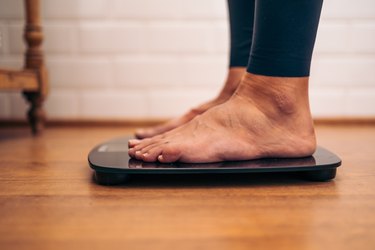
Sometimes dieting can be a lot like dating. There's the initial search to find that promising diet (person), followed by a honeymoon period where everything seems just perfect. The two of you are really clicking and it seems like maybe you've found your perfect match. (Mediterranean diet, where have you been all my life?)
But eventually the initial flush fades and sometimes you hit a rut. With dieting, that can happen fast: You might see a ton of progress on the scale during the first week, but by the time that second week rolls around, things are moving a little slower.
Video of the Day
Video of the Day
If that sounds familiar (dieting or dating-wise), you're not alone. And at least with dieting, there's a fairly straightforward explanation: It's often harder to lose weight the second week of a diet because your initial weight loss is really just a loss of water weight. The good news is, just because the scale slows down doesn't mean your diet isn't working.
Read on to learn how our bodies respond to diets, what your expectations for realistic weight loss and management should be and tips on how to succeed in long-term weight loss.
Water Weight Skews the Scale
Why exactly do you lose water weight when you start a new diet?
Sharon Katzman, RDN, a dietitian with the Chambers Center by PALM Health, explains that when you first start a diet and reduce your calories, your body reacts by using up the glycogen stored in your muscles and liver. Under normal circumstances, glycogen acts like a sort of stored fuel for your body. "It's your protection against a dramatic drop in blood sugar if you have to go hungry for a while," Katzman tells LIVESTRONG.com.
But glycogen also happens to retain water. So when you start that diet and effectively burn up your glycogen stores, any retained water in the glycogen is also burned up, which leads to that dramatic — if temporary — change in the scale.
Rekha Mandel, MD, a primary care doctor with the Chambers Center, notes that when you decrease your calories from carbohydrates, your body will use up its glycogen stores even faster because it doesn't have its preferred energy source (carbs) to pull from. That's why those who follow the keto diet, which dramatically reduces carb intake, might notice even more initial weight loss from water weight.
Does that mean all of the weight you lose in the beginning of a diet is water? Not necessarily, says Carla Schuit, RD, dietitian at Northwestern Medicine Central DuPage Hospital. Some of it may be due to fat loss, but the amount will vary from person to person.
"Water is a good amount of the weight loss in the initial phase," she explains. "This will vary depending on how much a person retains water, the severity and type of diet changes they make as well as how much weight they have to lose. Water weight fluctuates a lot from day to day and is affected by variables such as sodium and carbohydrate intake, hormones and medications."

Building Muscle Changes Your Body Composition
It's important to remember that even if the number on your scale isn't moving down, your body may very well be changing as a result of any new diet or exercise program you put into place. For instance, if you incorporate strength training into your routine, you may be replacing fat tissue with muscle tissue, which weighs more. That means your weight technically might not change, but you will be getting leaner and more toned.
"When you build muscle, the number on the scale may not initially go down as desired," explains Katzman. "Over time, building muscle increases your overall metabolism and allows you to lose more weight efficiently. Additionally, building lean muscle is crucial because loss of muscle not only slows our metabolism, but it can affect our bone health."
Instead of focusing on just weight alone, you can tell you're losing weight by measuring of your body, especially your waist circumference, to gauge how well your nutrition and exercise program is working, suggests Scott Jamison, MD, an internal medicine specialist with PALM Health.
What Realistic Weight Loss Should Look Like
As a general rule of thumb, losing about 2 pounds per week is realistic, says Katzman.
Dr. Jamison adds that even a weight loss of only 2 to 4 pounds per month is satisfactory, as long as you are approaching your weight loss holistically through sustainable diet and exercise.
While some popular diets that focus on cutting carbs and increasing your fat intake can lead to short-term weight loss, as of now, there isn't enough data to show that those types of diets are effective or even safe long-term. In fact, one study published January 2020 in JAMA Internal Medicine found that unhealthy low-carb diets are associated with a higher risk of death.
With that in mind, it can be helpful to remember that instead of focusing on any one diet that will help you achieve some magic number on a scale, you should focus on making healthy lifestyle changes that will make weight loss sustainable.
Katzman suggests starting with small steps like eliminating added sugar and processed foods, eating whole foods rich in fiber to keep you full and swapping sugary treats for fruit. "It is very difficult to keep motivated when we eat processed foods, which in turn cause cravings," she notes. "It is vital to detox off these foods to eliminate cravings and become aware of hunger cues.
It's also important to find a form of exercise that works for you and your body. "Finding something you enjoy will help you keep doing it," Katzman adds.
And finally, don't overlook the importance of reducing your stress levels to help you manage your weight, because excess stress is linked to weight gain in the body. "Stress management is crucial because how we deal with stress affects our appetite, our cravings, inflammation and our health," Katzman says.

Tips for Long-Term Weight Loss
The most important strategy you can use for long-term weight loss success is to make changes in your lifestyle that you can sustain long-term, says Schuit.
"I strongly encourage patients to create a foundation of habits they stick to," she says. "Those will be things they can apply to eating at a restaurant, at a friend's or at home. This helps create a lifestyle that is flexible and manageable long-term."
If weight loss is your ultimate goal, experts also recommend trying some of the following tips to help you reach your goals:
- Eat more vegetables. "Increasing your intake of vegetables improves
nutrient intake while keeping you satisfied with fewer calories," notes
Katzman. That's because veggies are full of filling fiber.
- Plan ahead. "Planning and preparation are always crucial
when making any change in diet," says Katzman. "It is essential to have healthy foods
available." She recommends trying strategies such as batch cooking on the weekends
for healthy meals like soup and chili, washing and cutting up vegetables in bulk so you have them on hand and stocking up on healthy frozen foods (which can be just as nutritious as fresh, and a lifesaver on a busy night).
- Keep a food journal. "Your food journal can help you and your
doctor better understand your eating habits, and guide how you may
improve them to help accomplish your goals," Dr. Jamison explains.
- Think more, not less. Instead of focusing on what you should eat less of,
Katzman recommends thinking in terms of what you should eat more of, such as
more whole foods like fruits, vegetables, whole grains, healthy fats and plant-based
proteins. "Use animal products as a garnish for plant-based meals," she suggests.
- Set realistic weight-loss goals. Aim to lose no more than 1 to 2 pounds a week, so you don't get discouraged after that
first week when the pounds seemed to melt away.
- Banish snacks. Dr. Mandel abides by the rule that you shouldn't
set yourself up for temptation. "People tend to fall into old patterns," she explains. "If
you are tempted to 'cheat' on your diet through snacking, make sure you have
plenty of fresh-cut veggies and fruits available. Do not keep other snack foods in the
house." Without processed, bad-for-you snacks at your disposal, you won't be
tempted — no matter how many times you open the fridge hoping something else will
appear. (Been there!)
- Celebrate non-scale victories. Schuit suggests that instead of just tracking your weight on the
scale, you should use non-scale achievements, such as physical endurance, how your
clothes fit and your mental and physical wellbeing to measure success as well.
- Don't give up if you veer off your nutrition plan. "Remember, it is what and how you eat 95 percent of the time that matters, so the occasional 'cheat' is not a crash," Dr. Jamison reminds us.
"Weight loss and maintenance is a lifelong process. Find the lifestyle choices that you can stick to long-term and avoid drastic quick fixes," Schuit says. "The bottom line is that the behaviors that get the weight off are most likely the ones we will need to maintain to keep the weight off."